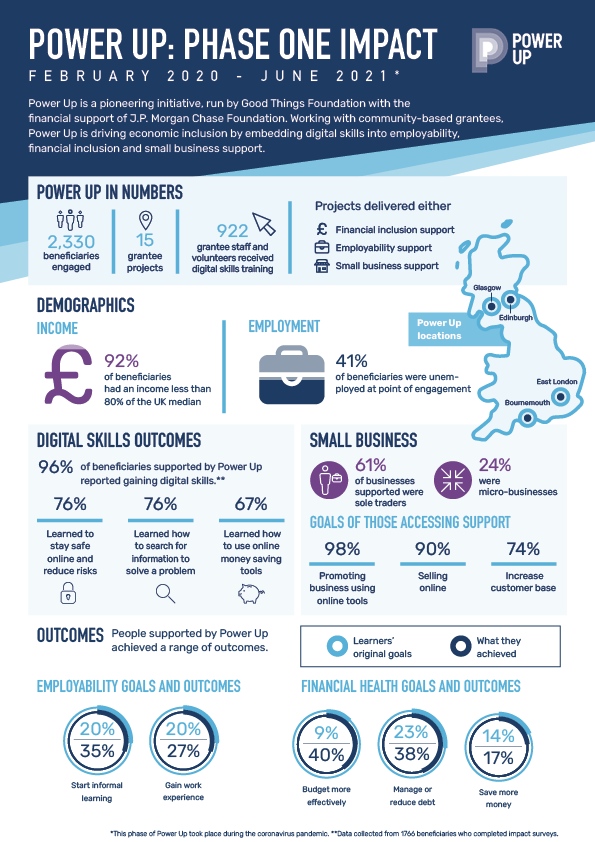Power Up: the impact of the project so far
Our Director of Partnerships and Fundraising, Adam Micklethwaite, explains the impact of the Power Up initiative so far and looks towards the future of the project for 2022.
Power Up was launched in 2019 in the UK as a collaboration between Good Things Foundation and the J.P Morgan Chase Foundation. It was a landmark social impact programme – the first time a major global grantmaker had embedded digital skills into programmes of economic support.
Recognising the prevalence of low digital skills amongst those facing barriers to progression, Power Up aimed to make social impact digitally inclusive.
The programme drew on research carried out by Good Things Foundation at the boundary between digital inclusion and economic intervention, and our experience of running community digital inclusion programmes in the UK and beyond.
With Phase 1 running from February 2020 to June 2021, Power Up funded 15 grantee projects across three pillars: financial health, employability, and supporting microbusinesses. 2,330 beneficiaries were supported to find better work, manage or reduce debt, and use online business tools, while gaining digital confidence, motivation and skills. Over 90% of beneficiaries had an income lower than 80% of the UK median.
During delivery, the Covid-19 pandemic created huge additional challenges to delivery, pushing many beneficiaries into crisis and bringing digital exclusion into even sharper relief. Our grantees rose to these challenges across the board.
Power Up is based on an outcomes framework – People, Provision, Place – designed to test how people can be supported to thrive in a digital world, how organisations can embed digital skills into their delivery models, and how local collaboration can increase the accessibility and availability of digital skills.
Within this framework, Power Up also adopted a deliberately flexible approach for grantees, giving them freedom to respond to the programme’s aims in ways which recognised the way they already work. This flexibility was important in order to learn how the framework could be applied to a diverse range of organisations working in communities.
Now, following the first phase of the programme: has the model succeeded?
People
The infographic below summarises the impact of Power Up so far. Crucially, we’ve seen both impact on economic progression and impact on digital skills – and within this, the proportion of beneficiaries improving their digital skills was very high (96%). In all cases, outcomes exceeded beneficiaries’ intended goals.
Although Power Up reached microbusinesses, only two grantees focused on this audience alongside other pillars, so the number was small – but there is evidence of impact on confidence in using digital business tools.

Provision
Grantees approached the embedding of digital skills in many different ways, with some creating digital skills components for their existing beneficiary journey, and one grantee fully integrating digital skills into their financial health model. We have been able to identify some success factors for the effective embedding of digital skills, with further exploration to follow.
Place
There were some early successes, with grantees forging local collaboration that increased awareness of digital skills and led the co-ordination of local cross-organisational initiatives – eg. the Edinburgh Collective and Wireless Poplar. But it is too soon to identify success factors across a range of place-based models.
We also know that some aspects of the programme didn’t work as well, and we have learned a great deal from Power Up during phase 1. For example:
- Economic progression hasn’t been as far/fast as originally intended. This reflected the Covid crisis and its impact on the goals of beneficiaries and the response from grantees, with all pivoting to provide emergency support and staying in this space for most of the delivery period.
- Flexibility for grantees is valuable, but with a new concept – in this case, embedding digital skills – it is helpful to provide as much clarity as possible about what success could look like. Although we wanted to explore the characteristics of ‘effective embedding’ through a flexible model, we could have been clearer at the outset about the potential success factors.
- And finally, Power Up demonstrated again that place-based change takes time. Although we have seen some excellent first steps, and the pandemic acted as a catalyst in some places for faster progress, more time will be needed to change relationships and working practices in a sustainable way.
Through this programme, and our partnership with J.P Morgan, we set out to explore a landmark idea, achieve impact, and create a body of practice that could inform the design and commissioning of other economic programmes in a digital world. So is Power Up a model that should be adopted more widely?
Digital skills are vital as the world recovers and rebuilds in response to Covid, with 92% of employers now saying they need basic digital skills from their employees (Worldskills UK, 2021) – and it’s clear that digital skills are an essential platform for financial inclusion and business growth and resilience.
But levels of digital exclusion in a post-Covid world remain high. Globally, almost half of the world’s population is still offline. In the UK, 14.9 million people have very low digital engagement, 1.5 million homes lack internet access, and 40% of those offline have incomes below £15,000 (Lloyds Banking Group, 2021; Ofcom, 2021).
And many of the charities and community groups best able to support those facing both digital exclusion and economic exclusion lack the capacity to do so, with over half (52%) of charities worried about digital exclusion and 40% still without a digital strategy (Charity Digital Report 2021).
Evidence from Power Up shows that beneficiaries can be supported to achieve economic progression and build digital skills, with multiplier benefits for their opportunity and progression. In a world where technology is taken for granted, and where digital exclusion often falls below other public and policy priorities, embedding digital skills end-to-end into all social and economic programmes must be the right approach.
There is more to do to understand the theory of change for organisations as they embed digital skills, and more time needed to understand the drivers of ‘digitally inclusive place-based change’.
But overall, Power Up has already shown that grantmakers and policymakers should adopt the central premise: embed digital skills.
We are now moving into the second phase of the programme, during which we will test how to accelerate progression for beneficiaries, and pilot a new model of tech adoption for under-represented microbusinesses. We will also be carrying out further exploration of ‘what works’ in driving place-based change that increases the awareness and availability of digital skills provision.
We look forward to continuing the journey, and our collaboration with J.P Morgan on this critical area of global policy and practice.
More from the Power Up initiative

Adam Micklethwaite
Director of Partnerships and Fundraising
With responsibility for Good Things Foundation’s programmes in the UK, Adam builds ambitious and innovative partnerships with Government, local councils, charitable foundations and the private sector to address society’s biggest challenges using digital.
